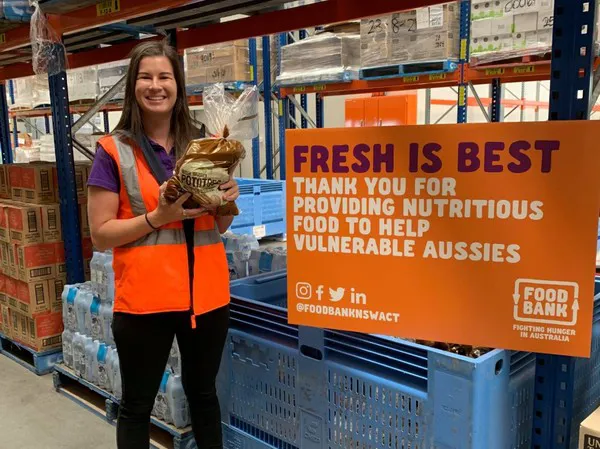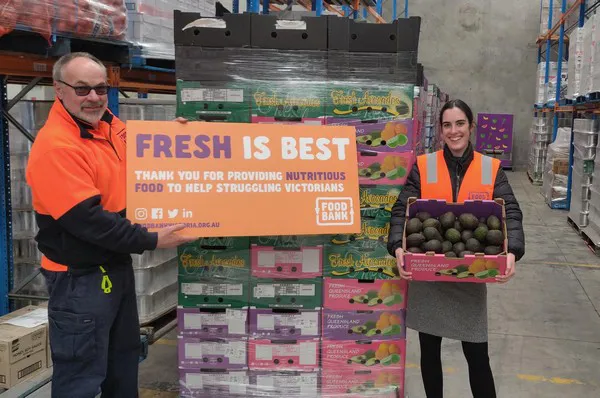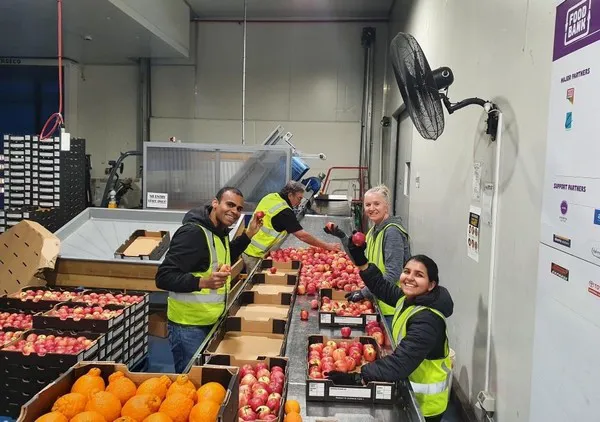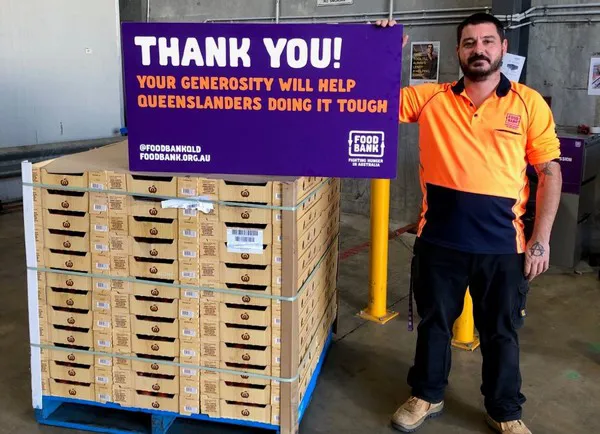Since the introduction of the iFoodDS/HarvestMark disposition feature at supermarket Distribution Centres (DC) there has been a significant increase in donations, according to one of Australia's leading hunger-relief charities Foodbank Australia.
There have been 240 occasions with 21659 cases of produce donated to Foodbank through the disposition feature in the third quarter of 2021 (from 1st July to 30th September). iFoodDS Regional Manager, Ilango Surendran says this number is most likely up for the rest of 2021 and the first quarter of 2022, through summer where the retailers will have more demand from the suppliers with the holiday season coming up and warm weather sometimes affecting quality on arrival to the retailer DC’s.
"We take all the food that is in perfect quality yet unable to be used and distribute to Foodbank to help those people in the community who are doing it tough because I believe there shouldn't be food insecurity globally," he said. "So, we are in this place because of things like food waste. Foodbank does a fantastic job collecting food that is perfectly edible. We know it’s tough because the donors are the farmers, and they are the growers who have spent money and effort to grow the product and when the product is rejected by the retailers, it's heartbreaking, but if we can find a second home for that product, it's great. We are also trying to add value along the supply chain to reduce the waste and assist the many of Australians who struggle to put a meal on the table."

Through its technology platform iFoodDS is able to provide specifications centrally, and uniformly manage quality control (QC) across all the DCs. This gives the produce suppliers the ability to select an option to donate fresh produce 'at the click of a button' very soon after it is rejected, meaning there is less time for the product to sit on the DC floor because there are fewer people and departments involved in the logistical process of getting the stock delivered. Under this system, produce is collected using the appropriate method of transportation directly from the DC, which saves sometimes days in transporting the fruit and vegetable to several locations before arriving at Foodbank.
That means the food is being donated when it is fresher, and Foodbank's National Program Manager - Agriculture Jacqui Payne says it allows the organisation more time to co-ordinate and physically deliver the product to where it is needed in the community.

"Some fruit and vegetables have a shorter shelf life, and we know it is being delivered to the retailer in its prime condition," she said. "That means we can capture it within 24 hours of the rejection, which is incredibly helpful. Products with a potentially longer shelf life we can distribute to rural and regional families to reach more people and charities. Of course, if there is a larger amount of produce on any given day, we can be very responsive; if we didn't have a scheduled pick up in the next 24 hours but the iFoodsDS daily report indicated a large supply, then we will add the pick-up to our schedule to ensure the produce remains fresh."
Ms Payne says Foodbank proactively works with partners right across the food supply chain to identify food that may be going to waste, and by streamlining the process through the iFoodDS/HarvestMark disposition feature it has led to more donors who are providing food, and even expanding the range of produce available for Foodbank due to it having been rejected. As well as the four main supermarkets, the organisation works with fresh produce companies such as Zerella Fresh, A&G Lamattina & Sons, Mitolo Family Farms and new companies are joining all the time to utilise this system enhancement to donate nearly every item of fruit and vegetables that are sold in stores.

"It gives suppliers another option to utilise when they might not have an alternate market, and that has assisted us to source some really fresh fruit and vegetables that we might not have received otherwise," Ms Payne said. "There was an existing system there, so (this disposition feature) is an enhancement to that to allow the suppliers to use the process. It is simple, streamlined and straightforward - the supplier gives it the electronic authorisation, which creates the 'paper trail' so the right people are notified instantaneously to allow us to collect it earlier in its shelf life - and we have more use for the product. This is a fantastic enhancement and provides a benefit to everyone involved. Obviously, we don't want suppliers to get rejections, but it is part of the industry, so it is good that the retailers are taking proactive steps to say here's another option we can utilise and it has been well received and we can see that by the increase in donors using this service. Also, simply talking about this, helps plant the seed for others to do the same, and look at ways to reduce what they might consider ‘waste across the supply chain’ and redirect it in a way that has significant impact and benefit for those doing it tough. Foodbank would like to thank the retailers and iFoodDS for their proactive role in making this option available to their suppliers to avoid unnecessary food waste and to help those doing it tough."
Mr Surendran added that there are several reasons that a product might be rejected, or not meet specifications, but that does not mean the fruit or vegetable is not safe for consumption.
"Retailers have a very specific process and specification of what they are looking for," he said. "When it falls slightly outside, it is rejected, but it is perfectly edible. The product could be too big or too small, or some skin marks or even the transport company may have lost the temperature for a while, so the cold chain was compromised. So, if it falls outside even slightly that means rejection, but again it's still very good to eat."

Donations through the iFoodDS/HarvestMark disposition feature is used nationwide at the state-based distribution centres, and Foodbank has warehouses Australia-wide, which makes collections several times a week. This also saves logistics in having to return product to the farm, which could be long-distance and even interstate.
For more information on Foodbank Australia's services, visit www.foodbank.org.au or use the Twitter hashtags: @FoodbankAus #EndHunger
Or contact:
Ilango Surendran
iFoodDS
Phone: +61 487 999 190
ilango@iFoodDS.com
www.iFoodDS.com
www.twitter.com/iFoodDS
https://www.linkedin.com/company/ifoodds
